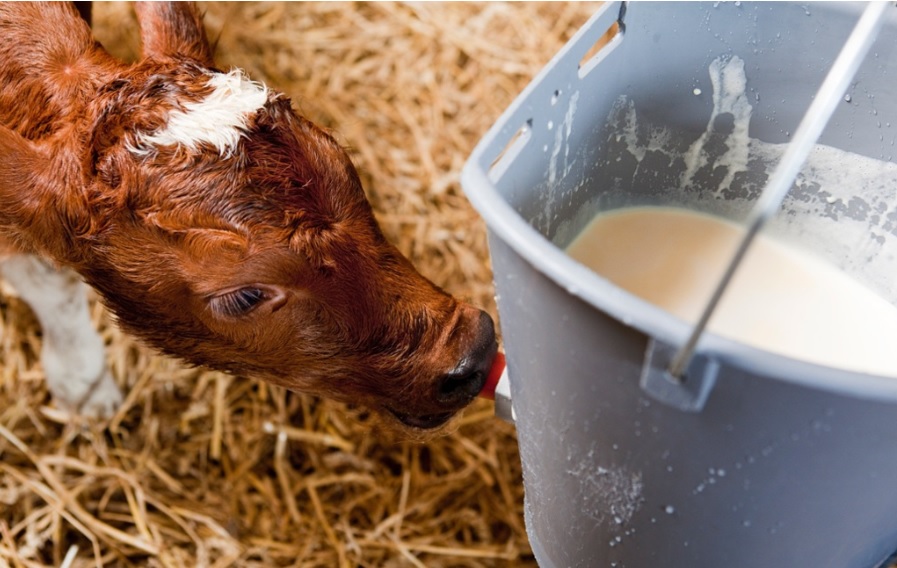Therapeutic Effect of Fermented Colostrum on Calf Diarrhea Syndrome
Abstract
Diarrhea in newborn calves under 30 days of age is one of the most significant cause of economic losses and pervasive concern in veterinary industry all around the world and infectious agents are the most commonly detected causes of calf diarrhea. In order to present a useful and convenient method for treatment of calf diarrhea, we evaluate the therapeutic effect of fermented colostrum on calf diarrhea syndrome. Thirty newborn Holstein calves, with diarrhea, were divided randomly in two equal groups (test and control). Both group of calves were received routine treatment protocol in the farm, furthermore calves in test group were fed once daily to 3 days, 300 mL naturally fermented colostrum. Vital signs (heart rate, respiratory rate and rectal temperature) and clinical scores (demeanour, mobility, dehydration, suckle reflex, feed intake (appetite) and stool consistency) were checked in all calves for 4 days. Clinical signs and clinical scores were checked in all calves for 4 days. The results of the present study showed that the use of fermented colostrum along with treatment protocols can accelerate the return of fecal consistency and feed intake of calves with diarrhea to normal and relieving dehydration.
Downloads
References
Acha, S. J., Kühn, I., Jonsson, P., Mbazima, G., Katouli, M., & Möllby, R. (2004). Studies on calf diarrhoea in Mozambique: prevalence of bacterial pathogens. Acta Veterinaria Scandinavica, 45(1), 1-10. https://doi.org/10.1186/1751-0147-45-27
Azizzadeh, M., Shooroki, H. F., Kamalabadi, A. S., & Stevenson, M. A. (2012). Factors affecting calf mortality in Iranian Holstein dairy herds. Preventive veterinary medicine, 104(3-4), 335-340. https://doi.org/10.1016/j.prevetmed.2011.12.007
Besser, T. E. (1993). Concentrations of passively acquired IgG1 antibodies in the intestinal lumen of the neonatal calf. Veterinary immunology and immunopathology, 38(1-2), 103-112. https://doi.org/10.1016/0165-2427(93)90116-L
Chundawat, H., & Joshi, H. (2015). Antagonistic effect of Lactobacillus isolates from cow milk on selected pathogenic bacteria. Res J Recent Sci, 4, 173-176.
Constable, P.D., Hinchcliff, K.W., Done, S.H. and Gruenberg, W. 2017. A textbook of the diseases of cattle, horses, sheep, pigs, and goats. 11th ed. Saunders/Elsevere, London, UK.
Ellinger, D. K., Muller, L. D., & Glantz, P. J. (1980). Influence of feeding fermented colostrum and Lactobacillus acidophilus on fecal flora of dairy calves. Journal of Dairy Science, 63(3), 478-482. https://doi.org/10.3168/jds.S0022-0302(80)82957-2
Mitchell, I. D. G., & Kenworthy, R. (1976). Investigations on a metabolite from Lactobacillus bulgaricus which neutralizes the effect of enterotoxin from Escherichia coli pathogenic for pigs. Journal of Applied Bacteriology, 41(1), 163-174. https://doi.org/10.1111/j.1365-2672.1976.tb00615.x
Pourjafar, M.; Badiei, K.; Nadalian, M.Gh. and Jafari Jozani, R. (2011). Effect of Long Term Administration of Frozen and Fermented Colostrums of Vaccinated Cows on Performance and Prevention of Neonatal Calf Diarrhea. Pak. Vet. J., 31(3): 199-202.
Quigley, J. (2002). Passive immunity in newborn calves. Advances in dairy technology, 14, 273-292.
Saalfeld, M. H., Pereira, D. I. B., Silveira, K. R. K., Schramm, R., Valente, J. D. S. S., Borchardt, J. L., ... & Leite, F. P. L. (2013). Anaerobically fermented colostrum: an alternative for feeding calves. Ciência Rural, 43(9), 1636-1641. http://dx.doi.org/10.1590/S0103-84782013000900016
Saalfeld, M. H., Pereira, D. I. B., Valente, J. D. S. S., Borchardt, J. L., Weissheimer, C. F., Gularte, M. A., & Leite, F. P. L. (2016). Effect of anaerobic bovine colostrum fermentation on bacteria growth inhibition. Ciência Rural, 46(12), 2152-2157. http://dx.doi.org/10.1590/0103-8478cr20160393
Salman, M. D., King, M. E., Odde, K. G., & Mortimer, R. G. (1991). Annual disease incidence in Colorado cow-calf herds participating in rounds 2 and 3 of the National Animal Health Monitoring System from 1986 to 1988. Journal of the American Veterinary Medical Association, 198(6), 962-967.
Sandine, W. E. (1979). Roles of Lactobacillus in the intestinal tract. Journal of Food Protection, 42(3), 259-262. https://doi.org/10.4315/0362-028X-42.3.259
Svensson, C., Lundborg, K., Emanuelson, U., & Olsson, S. O. (2003). Morbidity in Swedish dairy calves from birth to 90 days of age and individual calf-level risk factors for infectious diseases. Preventive veterinary medicine, 58(3-4), 179-197. https://doi.org/10.1016/S0167-5877(03)00046-1











